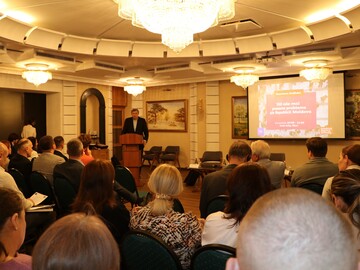
IDIS Viitorul has presented the 100 most pressing socioeconomic problems faced by Moldova in 2024
The study was conducted by an interdisciplinary team of IDIS "Viitorul" experts in partnership with the Friedrich Ebert Foundation Moldova. It includes assessments from experts in various fields, including economics, energy, small and medium-sized businesses, education, justice, foreign policy, security, the environment, public procurement, and media. The study aims to identify and accurately understand the key challenges faced by society through a comprehensive analytical approach. The study groups the most pressing issues into 10 categories. Thus, in the economic and energy sectors, the most serious problems include high inflation and declining purchasing power, a trade deficit and import dependence, declining foreign direct investment and growing public debt, reliance on diaspora remittances, low labor productivity, youth unemployment, the outflow of skilled workers, vulnerable gas supplies and unstable electricity supplies, a declining and deteriorating export structure, an alarming decline in the employed population, etc. In the SME sector, labor shortages are observed, tax issues and limited access to financing are limited, a large proportion of enterprises operate in the shadow economy, high corruption, weak infrastructure, and low levels of entrepreneurial skills. In the social sphere, high levels of poverty in rural areas, rising costs of living, limited access to healthcare, labor migration, insufficient pensions, etc. In the agricultural sector, there is a lack of irrigation, limited funding for farmers, insufficient support for farmers, unfair competition, etc. The publication is available at the link: http://viitorul.org/files/library/fes-pub_100-presante-Probleme-tipar.pdf. The study was prepared based on a functional methodology that combines quantitative and qualitative approaches, official statistics and the opinions of recognized experts in the relevant fields. The authors of the study note that a delay in addressing the identified problems may lead to serious deviations in the country's socio-economic development. At the same time, it is becoming clear that the scale of these problems is large and cannot be resolved solely through domestic resources. Attracting European funds is a necessary and viable solution, but the receipt of these funds depends on the pace and consistency of reforms implemented as part of the European integration process. "The EU, through the Economic Growth Plan, will provide Moldova with significant support aimed at European integration, socio-economic development and strengthening resilience. In 2025-2027, Moldova will receive financial assistance of about €2 billion, intended to support reforms, strengthen security and combat disinformation and external interference. We are confident that some of these resources will be effectively used by government institutions, including to address the issues identified in the study," the authors note. // 06.11.2025 — InfoMarket







